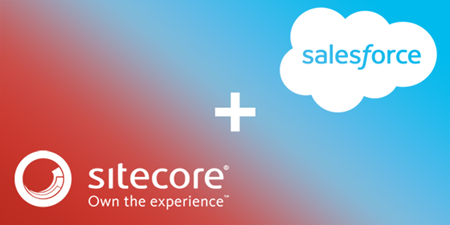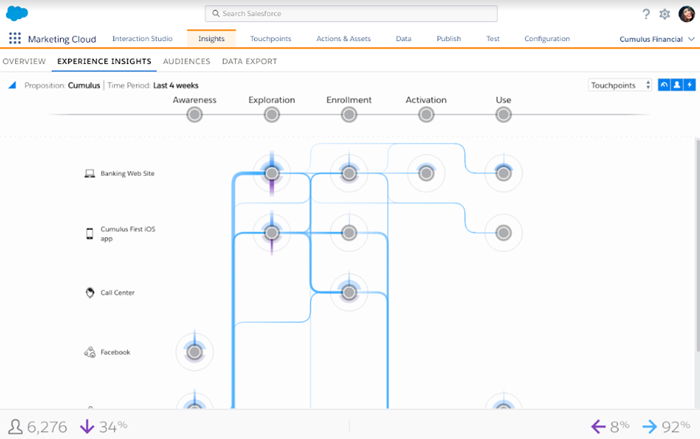Sitecore Announces Core Integration with Salesforce
Sitecore, a provider of experience management software, has recently announced that it is delivering phase one of the Sitecore Connect software for Salesforce Marketing Cloud customers.
 This first release provides an integration for Sitecore Experience Manager and Sitecore Experience Platform with Salesforce Marketing Cloud to help customers deliver highly personalized, connected experiences.
This first release provides an integration for Sitecore Experience Manager and Sitecore Experience Platform with Salesforce Marketing Cloud to help customers deliver highly personalized, connected experiences.
Jon Suarez-Davis, Chief Strategy Officer, Salesforce Marketing Cloud commented on the release to say “Companies have to transform the way they engage with customers that have come to expected tailored experiences across every touchpoint. With Salesforce Marketing Cloud and Sitecore, users are able to better understand customer interactions across all channels—now including websites--and optimize marketing campaigns in order to enhance the complete customer journey,"
Sitecore's relationship with Salesforce is designed to bring together Sitecore's content management and experience platform capabilities to Salesforce Marketing Cloud. By teaming up, Sitecore and Salesforce customers can now streamline the digital marketing experience and give them faster time-to-market so that team’s can access content and images to power smarter and more relevant campaigns.
Exclusive Interview with Sitecore's Ryan Donovan
To get an inside scoop on the announcement, I was fortunate enough to connect with Ryan Donovan, EVP of Product Management at Sitecore. Read below for the exclusive CMS-Connected Interview:
 What was the driving force for Sitecore to team up with Salesforce?
What was the driving force for Sitecore to team up with Salesforce?
Donovan: "Simply, the driving force behind our relationship is to answer customers’ call for faster time-to-market. But let’s double-click on that a bit. Our goal is to deliver speed to the data-driven marketer, but also power. Time to market is a critical concern because, in a world of constant digital transformation, time is a luxury none of us possess. But we also know that customer experience reigns supreme as any company’s differentiator. If your future depends on how you deliver on your customer experience, your power as a marketer is measured in the ability to solve for customer’s unique needs through end-to-end, personalized customer experiences. Ultimately, the combination of Sitecore and Salesforce enables digital marketers to deliver their digital brand experiences faster, informed by a more holistic view of the omnichannel customer journey, with the potency of an individualized end-to-end experience for each and every consumer."
What challenges does this new release address for Sitecore and Salesforce users?
Donovan: "Through the jointly-developed Sitecore connector, Sitecore content is now accessible within Salesforce’s Content Builder, the content editor leveraged by Salesforce Email Studio and Journey builder. As a result, the marketing team no longer needs to necessarily maintain a working knowledge of both Sitecore and Salesforce interfaces since the content surface directly at the marketer’s fingertips. Easy access to Sitecore content in Salesforce tools reduces the time to find assets, and largely eliminates the need to import/export content or switch between toolsets."
In the press release you state “With Sitecore Connect and Salesforce Marketing Cloud, marketers don’t have to think about how to integrate Sitecore-managed assets into their Salesforce email campaigns—it’s conveniently there and ready for them to use.” What are some other major benefits for Marketers?
Donovan: "The streamlined workflow enabled by the Sitecore Connector for Salesforce Marketing Cloud doesn’t just help marketers achieve faster time to market and continually deliver fresh, relevant, and personalized content across channels—or improve their experience doing so. The reduced complexity of marketing operations and ability to leverage existing assets also improves total cost of ownership. In addition, because the solution is developed, tested, maintained, and supported by Sitecore and Salesforce, customers get improved quality, reliability, and support than with other integration approaches."
In the press release it’s also mentioned that “With Salesforce Marketing Cloud and Sitecore, users are able to better understand customer interactions across all channels—now including websites–and optimize marketing campaigns in order to enhance the complete customer journey.” What are your thoughts on customer journey and where do you see it heading in the future?
Donovan: "Fundamentally, the customer journey will continue to be shaped by the fact that consumers, not companies, will decide when, where, and how they want to engage. But those decisions will still be driven by customers’ affinity for experiences that are reliable and effortless across channels, and are quick to respond to their specific needs and requests.
If we’re going to continue to meet increasing expectations, we have to realize first and foremost that the customer is mobile and operates in a multi-modal world. An explosion of devices is now available to help us receive information contextualized to a myriad of circumstances: in our living room, browsing a store aisle, while working out, driving to an appointment, and much more. Technologically, this requires content to be aware and adaptive not only to device type, form factor, and delivery method (such as text, voice, AR/VR, and other environments still to come to the market), but also location and activity. In turn, innovative marketers increasingly will turn to cloud-powered, headless content systems that manage content as a channel-agnostic service that can be seamlessly distributed, repurposed, and reused across multiple sites, channels, and all kinds of endpoints.
Artificial intelligence also will continue to work its way deeper into customer care and nurturing the customer’s journey. But AI will augment, complement, and amplify human marketers’ efforts, not supersede or replace them. Some aspects of the customer journey may be handled by automated systems; however, the power of AI and machine learning will be most acutely felt through the delivery of actionable insights that will help the marketer make more strategic decisions such as predicting the likelihood of conversion through a particular piece of content; understanding which content topic is the most relevant for each customer across channels; or automatically optimizing and assembling the right content for the right audience at scale.
Finally, customers will increasingly move to self-serve models as their preferred method of interaction with a brand. Customers are growing less responsive to standard nurture campaigns and online catalogues—they’re gravitating to content-rich, connected experiences where they are inspired instead of sold to. The companies that drives an unfair advantage in the environment will be those who go beyond merely simplifying the transaction process to recognizing customer intent and serving contextualized information that leads to a transaction of value to the customer."
Salesforces’ Marketing Cloud at a Glance
As you’re reading through this article, you may be wondering how exactly the new Marketing Cloud solution works; well, you’re not the only one, so I decided to do some research on my own to find out a bit more. I happened to come across a recent blog post by Matt Tippets, VP Product Management, Salesforce Marketing Cloud as he expanded more on what to expect with the new experience.
To summarize Matt’s blog post:
“Interaction Studio reacts to the real-time behavior of consumers as they interact with a brand’s owned channels, including online through email, social and mobile, and offline via in-store or kiosks. For example, if a consumer clicks on a certain offer from a brand and then logs into the mobile app or calls the service center, Interaction Studio instantly updates individual consumer engagement profiles with those real-time actions. With that context, Marketing Cloud can deliver the next best experience — such as relevant promotions, discounts or other content — at any moment as consumers engage with the brand.

Unfortunately, most companies today are using multiple siloed, channel-specific marketing solutions, which also lack the real-time context they need from consumer interactions to deliver personalized consumer experiences. According to Salesforce Research, less than 25 percent of marketers are completely satisfied with their ability to deliver the right message, in the right channel, at the right time. The same research finds that more than half of consumers surveyed say personalized engagement based on past interactions is very important to winning their business.”
Matt discussed the key features that the Interaction studio offers:
-
Real-Time Offer Management: Interaction Studio suggests the next best offer for consumers across all channels based on how they behave on a company’s owned channels. That offer can be delivered through a personalized email, an app notification or even an in-store engagement where a sales rep accesses a consumer’s profile to view recommended offers. For example, if a consumer were browsing a retail site for red shoes, but doesn’t checkout, Interaction Studio captures that information and can then automatically present an offer for similar shoes to the consumer through any owned channel, even in the physical store.
-
Campaign Orchestration: Interaction Studio's sophisticated decision engine allows marketers to control campaigns at scale, using frequency capping and business rules to ensure each offer, message and journey is relevant to the customer. For example, let’s say a person is initially looking at opening a savings account on a financial services website, but then starts to browse for 401K plans. The behavior indicates the person has an interest in a 401K product and, with campaign orchestration, the financial services company can automatically include the person in a 401K campaign to show them content relevant to 401Ks on the website and through email marketing.
-
Lifecycle Insights: With analytics and visualizations, marketers can better understand engagement trends that will help them develop marketing experiences that resonate with consumers. Marketers can visualize how consumers have interacted with different touchpoints or channels, such as email or a commerce site, as well as gain insights into how consumers move across lifecycle stages such as awareness, exploration and enrollment.
Matt also mentioned “Interaction Studio expands on the cross-channel experience capabilities of Marketing Cloud Journey Builder. The way it works is consumers traverse through journeys built and managed in Journey Builder, their state and context changes. Journey Builder’s native integration with Interaction Studio makes it seamless to instantly insert into or switch consumers from one journey to another based on the real-time interactions they have with a brand. For example, once a consumer creates an account on a retailer’s website, they can be instantly removed from an “account complete abandon” journey and added to an “activation promo journey.” In addition, within Journey Builder, Interaction Studio manages real-time eligibility and frequency-capping before sending a promotion — ensuring that the right message is delivered based on the consumer’s context.”
You can click here to find out more about Salesforce’s Interaction Studio.
Salesforce Expands UK & Canada Presence
Over the next five years, Salesforce is planning to invest $2.5 billion in its UK business to support their growing customer base.
With the recent opening of the new Salesforce Innovation Centre in Salesforce Tower in London, this announcement comes with no surprise. Salesforce will also be opening a UK data center as well as UK Salesforce employees pledging to volunteer 50,000 hours in 2018 in order to make that happen.
Back in February of this year, Salesforce used this strategy with also their Canadian business base, investing in $2 billion in their Canada presence.
 Over 6,000 Canadian companies use the Salesforce platform such as Air Canada, Husky Energy, Loblaws, Manulife, Roots, TD Bank, TELUS and more.
Over 6,000 Canadian companies use the Salesforce platform such as Air Canada, Husky Energy, Loblaws, Manulife, Roots, TD Bank, TELUS and more.
Just yesterday, Salesforce announced their Trailblazer fund of $100 million to invest in Canadian startups to fuel cloud innovation and customer success in the region. This fund will support entrepreneurs building companies on the Salesforce Platform and creating technologies to deliver unique capabilities to their Salesforce customers.
Salesforce has supported startups since 2011 which includes 7 investments. One of those investments has been with Vidyard who we just happened to cover here on CMS-Connected a couple months back. Vidyard is a leading video marketing platform that helps businesses drive revenue through the use of online video.

Gabriella Pirrone
Gabriella is the Digital Marketing Assistant for CMSC Media. She brings a wealth of knowledge from not only a CMS perspective but also content, SEO and eCommerce. She enjoys everything social media and staying ontop of the latest trends in the digital marketing world.